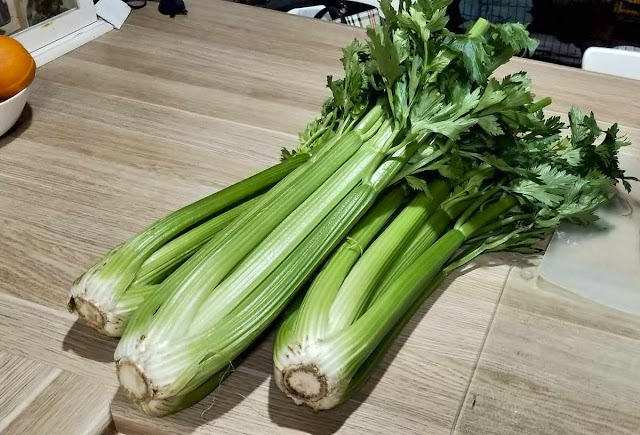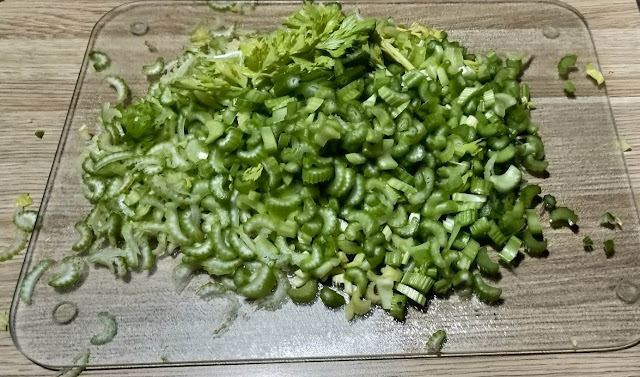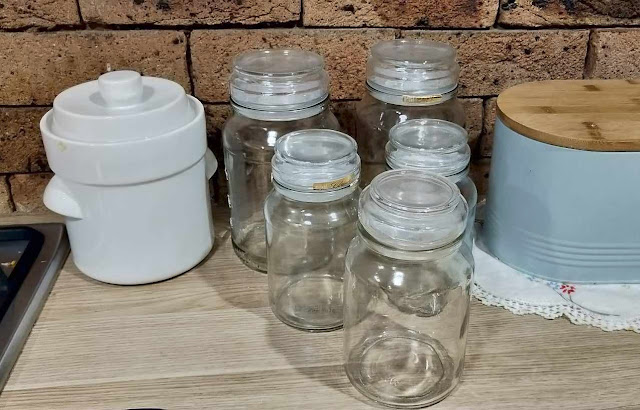Sometimes I forget that we are living the Cheapskates way, a frugal lifestyle, where nothing is wasted and we watch our money.
We have lived this way for so long, almost 29 years, that it is habit now.
I empty the little complimentary packets of sugar and salt into the canisters if I don't put them in the picnic basket.
I tip sauce bottles upside down and then top up the new bottle, then add a little water, shake and pour into gravy or soup or pasta sauce.
I save the hard ends of cheese to use in sauces (not often but occasionally someone will leave the bag open and then end goes hard). I put them in the freezer until I need to use them.
I use a silicone spatula to scrape every last bit of dough or batter from the bowl.
Add a little milk to mayo bottles to get it all out.
Put cooking oil into a little jar and use a silicone pastry brush to brush oil onto frying pans and grills rather than pouring it in; saves oil and therefore keeps more money in the grocery budget, and keeps unnecessary kilojoules off our waists.
Save soap ends to use in washing powder. It takes 125g of soap to make one batch of Cheapskates Washing Powder.
Use a teaspoon to measure the washing powder into the machine - the washing is clean, the washing machine stays in tip top shape by not overloading it with detergents, and I'm not wasting money by over-using.
Add water to an "empty" shampoo bottle, shake it up and then use it to clean the bath, shower, basin and toilet at least once, often two or three times.
Dilute dishwashing liquid 50:50 with water.
Trim the bottom off the toothpaste tube and scrape every last blob of toothpaste out.
Turn appliances off at the wall. Exceptions: fridge and freezers. Only turn the power point on when that particular appliance is to be used.
In winter we close the blinds and drapes around 5pm to keep the warmth in the house.
I also wipe foil and reuse it, wipe over baking paper and reuse it until it crumbles.
Boil the kettle and fill the thermos, and use that for hot drinks during the day.
Wash and dry plastic bags - freezer bags, veggie bags, bread bags, ziplocks, sandwich bags etc.
Rinse milk bottles and pour onto the veggie garden to water and fertilise; tomatoes especially love the extra calcium, it helps prevent blossom end rot.
Save brown paper bags to use for draining fried food and lining cake tins.
Trim down the daggy ends of wrapping paper, iron and reuse.
Always take buttons and zippers off clothes before they are turned into rags.
Re-hem towels and hand towels when the edges become frayed.
Cut old towels into bath mats and hand towels, old bath mats into hand towels and face washers, old hand towels into face washers and cleaning cloths.
Save tea bags and reuse them, then dry them and use as firelighters or to add to the compost.
Save coffee grounds to add to pin cushions, the compost or to use as fire lighters.
We eat the leaves as well as the beets on the homegrown beetroot (try them wilted in a little olive oil and garlic, delicious).
Save the leaves from bunches of celery, dehydrate and powder them to add to soups and stews for extra flavour and nutrition.
We eat the stems as well as the heads of the broccoli we grow.
Dehydrate the turnip tops, and powder to make green powder to add extra nutrition to soups and casseroles.
Always, always put dry goods into the freezer for at least one week before putting them into the pantry. This kills any weevils or other bugs that may be in the flour or rice or oats or pasta or legumes so my pantry stays weevil free and we don't waste food.
Save the dividers from the tea bag box to use as bookmarks.
Save jars and lids to reuse for preserving.
Save veggie peelings in the freezer to make stock.
Save the water from the steamer pot and use it to make gravy or add to stock, or to make soup.

























.jpg)


